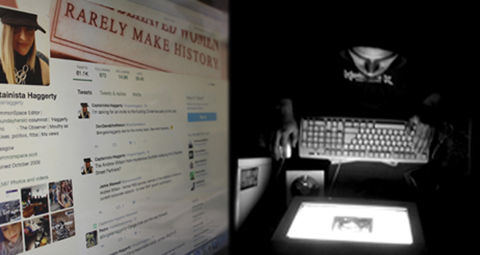September 9 | ![]() 0 COMMENTS
0 COMMENTS ![]() print
print

The online abuse goes on and on…
Winning a court case has not halted the stream of sectarian intimidation
I REMEMBER the day in 2013 when the verdict came through in my court case. My heart was pounding when I heard the decision: guilty. I had a rush of relief and I thought, surely, that it was the end of a horrifying chapter. But it wasn’t.
The guilty verdict had been delivered against a man, David Limond, who’d targeted me with a tirade of abuse online after I’d edited a high-profile book (Downfall: How Rangers FC Self Destructed) about the financial collapse of Rangers in 2012.
It was my first big break in the media industry, and I was thrilled to have been given the job by author and journalist Phil Mac Giolla Bháin.
But there was a problem. Phil wasn’t just any journalist, and I wasn’t just any editor. Both of us came from Irish Catholic stock, and our involvement in the Rangers story enraged the hardcore element of extreme Rangers fans who continue to be intolerant of our places in Scotland.
Until that point, social media had been a success story for me. I joined Twitter as a student journalist, and found that the social networking site was a great place to gather information on big stories and meet the journalists involved in them.
That was how I met Phil, who’d broken some of the biggest stories warning of Rangers’ demise, and how I found myself editing a much-anticipated book.
I was delighted, thrilled. It was a huge opportunity amid unprecedented events in Scottish football. As a journalist, it was where I wanted to be, and I had to pinch myself often to be sure it was real. When it started to become clear on social media that the book was in the works, and I could tell people of my involvement, I was excited, and even though I knew of the history of threats and abuse already directed towards Phil, I could never have imagined it would arrive at my doorstep in the way that it did.
I soon became the subject of online blogs and discussion forums, where a fierce core of Rangers fans painted me as a legitimate target for smears and abuse.
It escalated quickly, and I was shocked one evening to log onto Twitter and find a stream of abusive messages had been sent to me all at once, full of language I won’t repeat.
I quickly found that the source of the abuse was an online podcast—the internet’s equivalent of a radio show—hosted by Limond. In a segment of his ‘Rangers Chat’ programme, he featured me in what appeared to be a regular slot called ‘Taig of the Day.’
In it, he told listeners how to contact me and urged them to send abuse my way. She’s got to ‘be told,’ he said, she’s got to get ‘bang bang bang.’
I was frightened. I had come to the attention of not only Limond, but groups like the Vanguard Bears, a group of anonymous Rangers fans.
On their website, they describe themselves as ‘a group of Loyalist and Unionist Rangers supporters, whose aims are to ensure that the good standing and unionist tradition of the quintessential British club is maintained, and to support the Protestant Unionist Loyalist community in Scotland.’
Suddenly everything felt very serious. I went to the police, and I wish I could say that the rest was history, but it wasn’t, it was a fight. The police initially told me there was no case, that these things were just par for the course in Scotland. It wasn’t until Channel 4 News got involved and came to Scotland to film a piece about a significant number of threats being made not only to journalists like me, but to legal officials and others involved in the Rangers story, that things moved.
It was then that the police re-opened my case and arrested Limond, and officers were later forced to admit in court that they’d originally dismissed the case without listening to the podcast, the evidence I’d sent them. When he was found guilty after a two-day trial, the sheriff handed down a six-month prison sentence to the man who’d nearly got away with his crime without an inch of scrutiny from Police Scotland.
In hindsight, it almost seems foolish to have believed a guilty verdict would signal the end of the story. The Limond incident happened four years ago, and in that time I’ve continued to receive regular, sometimes daily, online abuse on account of me being a ‘fenian.’
This group of extremist Rangers fans have tried to get me sacked from every job I’ve had since Downfall, and on one occasion in my previous employment the police had to be called in after the details of my colleagues were posted on a particularly vicious Rangers discussion forum online.
If they couldn’t silence me directly, tactics would move to trying to intimidate my colleagues or my family in a bid to make me walk away.
Social media is often an amplifier for all the worst things in society, and it’s offered a revealing insight into the nature of modern sectarianism in Scotland. These are not random acts of abuse, they are orchestrated, targeted campaigns against individuals, sometimes lasting years.
Former Celtic manager Neil Lennon was also a big target on social media, a forum he’s since left. The Irishman was subjected to unforgivable abuse and violence during his time at Celtic, both as a player and manager, and a number of people have been convicted because of it—some of those cases a result of online abuse.
I’ve often told people that I feel as though my picture has been stuck up on a dartboard somewhere: once I’d appeared on the radar of these people, it was like having a permanent label attached to me.
In one chilling incident, my photograph was posted online on a ‘death list’ drawn up by the Vanguard Bears, something that was later excused as ‘banter’ by some.
It wasn’t so funny when two others on the collage of photographs, lawyers Paul McBride and Paul McConville, had big red crosses drawn over their faces when they died.
In another high-profile case this year, I temporarily lost my column at the Sunday Herald when the Rangers board itself intervened after taking exception to my support of fellow journalist Graham Spiers on Twitter, who’d found himself at the centre of a stramash after writing about sectarianism at Rangers.
It was an incident that worried me: despite everything I’d been through because of the intolerance of some Rangers fans, it didn’t seem like the club took the abuse seriously.
Thankfully, my column was reinstated after a public outcry.
With Rangers joining the Scottish Premiership this season, I worry about the potential for escalation. I’m Catholic and I come from Irish heritage; that’s enough of a crime in the eyes of this extreme minority for them to continue their focus on my movements.
The easy thing to do would be to quit social media altogether, to block it out, but I’m not one for taking the easy route, as the last four years likely shows. I grew up aware of the stories of discrimination my family faced in Scotland because of their faith and their heritage, and I refuse to be silenced now.
The Irish Catholic community in Scotland has fought to overcome barriers and discrimination, and my tale is just another in a long line.
But the individuals involved in this behaviour online are cowardly, and it’s only by keeping my voice raised—on and offline—that they will be exposed. They are on the wrong side of history, and despite the noise on social media, things are changing.
People sometimes ask me how I feel about the perpetrators of this abuse, and whether I could ever forgive them. The truth is that there’s no need to.
I don’t bear any personal grudge. I don’t know these people, and they don’t really know me. I’ve just become trapped in a fight that’s been going on for decades: this isn’t really about me.
Moving forward requires less anger and more understanding. We need to communicate within our communities, not on social media, where it’s rarely productive.
The attitudes displayed on these forums may be extreme, but they are confined. I really believe Scottish society wants to leave the shackles of racism and bigotry behind, and that’s the Scotland I hope I’ll one day live in.
Angela Haggerty is editor of commonspace.scot and a columnist for the Sunday Herald











